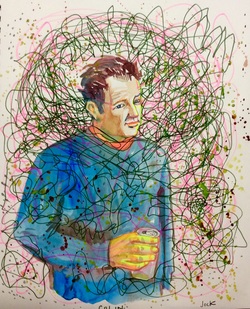AUTHOR PROFILE
Colin Dodds is the author of Another Broken Wizard, WINDFALL and The Last Bad Job, which Norman Mailer touted as showing “something that very few writers have; a species of inner talent that owes very little to other people.” His writing has appeared in more than two hundred publications, and been nominated for the Pushcart Prize. Poet and songwriter David Berman (Silver Jews, Actual Air) said of Dodds’ work: “These are very good poems. For moments I could even feel the old feelings when I read them.” Colin’s book-length poem That Happy Captive was a finalist for the 2015 Trio House Press Louise Bogan Award as well as the 42 Miles Press Poetry Award. And his screenplay, Refreshment, was named a semi-finalist in the 2010 American Zoetrope Contest. Colin lives in Brooklyn, New York, with his wife and daughter. See more of his work at thecolindodds.com.
|
Image Credit: Danny Jock
|
Why do you write?
I’ve done it for almost every reason you can imagine--financial, spiritual, amorous, spiteful, celebratory, self-aggrandizing, self-deprecatory and artistic. I’ve written for money, and still do. I’ve written for the joy of it, and still do. I’ve tried to do both at the same time, and the results have been mixed, both money- and joy-wise.
Beyond that, I’ve mostly written just to grasp what I think, to understand the world. It’s almost like another sensory organ to me, which in some small way harmonizes the others. It’s the only way I know to touch these flashes of understanding that lunge from the periphery and vanish.
Writing has been constant and central since I was 14 or so.
It’s taken a lot of forms and have served a wide array of purposes. In the last few weeks, I’ve been working on a novel, a few poems, along with writing disclaimers for a major financial institution, praise a budget steak restaurant and a blessing for my newborn daughter.
Beyond that, I’ve mostly written just to grasp what I think, to understand the world. It’s almost like another sensory organ to me, which in some small way harmonizes the others. It’s the only way I know to touch these flashes of understanding that lunge from the periphery and vanish.
Writing has been constant and central since I was 14 or so.
It’s taken a lot of forms and have served a wide array of purposes. In the last few weeks, I’ve been working on a novel, a few poems, along with writing disclaimers for a major financial institution, praise a budget steak restaurant and a blessing for my newborn daughter.
What other creative activities are you involved in?
A few, now that I think about it. But most of them have writing at their core. I sang in a band for a while, and we had what I thought were a couple good songs, but more or less left it at that. I painted when I was younger, and had the time and space for it. I also directed and co-produced a short film not too long ago.
Who is your favorite author and why?
I’m going to dodge this one. I move around quite a bit, reading-wise, and what I’m crazy about one week can annoy the heck out of me the next. It’s also extremely rare that I’ll like all the books in an author’s body of work. I am impatient and ruthless, and neither moral nor dutiful in my reading habits.
I know that listing books and authors is a way of locating your own work inside a tradition, and perhaps establishing your bona fides as a learned fellow. But I’ve always disliked doing it.
I know that listing books and authors is a way of locating your own work inside a tradition, and perhaps establishing your bona fides as a learned fellow. But I’ve always disliked doing it.
Tell us about the mechanics of how you write.
The mechanics vary from genre to genre and work to work. But my circumstances also play a big role. I use to work more in bars, or at long stints holed up at the desk. With a baby and full-time job, it’s been more about trying to keep an idea consistently in my mind and then tapping notes into my phone on the train or the sidewalk.
Those notes are how a first draft, whether for a novel or a book of poems or anything, really, accumulates and takes shape..
Then it’s a matter of getting the tapped, typed and scribbled bits together. Sometimes I follow them where they lead. Others, it’s a matter of fitting them into a preordained structure. Most of the writing is rewriting--getting to the bottom of why I started in the first place, ripping things apart, discarding old starting points, bringing things back, recombining and reducing. This continues for 3-15 drafts until a strong mix of satisfaction and disgust draws the process to a close.
Those notes are how a first draft, whether for a novel or a book of poems or anything, really, accumulates and takes shape..
Then it’s a matter of getting the tapped, typed and scribbled bits together. Sometimes I follow them where they lead. Others, it’s a matter of fitting them into a preordained structure. Most of the writing is rewriting--getting to the bottom of why I started in the first place, ripping things apart, discarding old starting points, bringing things back, recombining and reducing. This continues for 3-15 drafts until a strong mix of satisfaction and disgust draws the process to a close.
Finally, what do you think about Carp, the fish, not our website?
The costume jewelry of the sea. It’s flashy, bright, but not edible, a garbage fish. Like how to carp on something means to repeat or invoke it without adding any new information. It always seemed like a gaudy echo of a better fish, like a fashion model/actor playing a great man in a TV movie.

